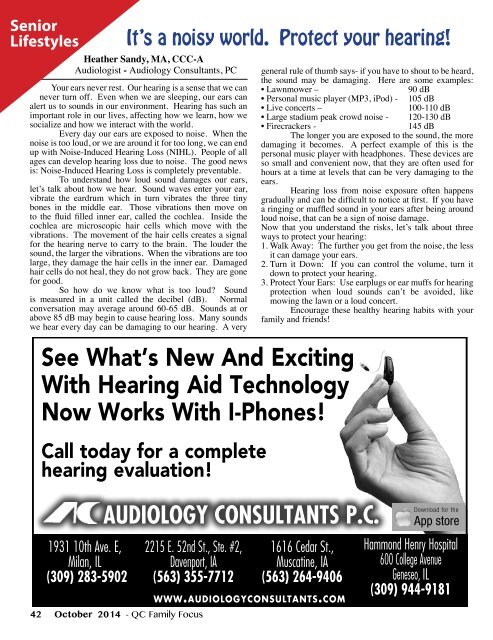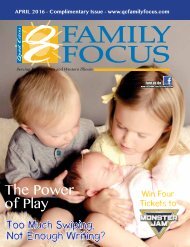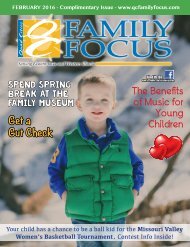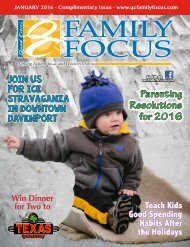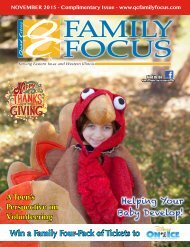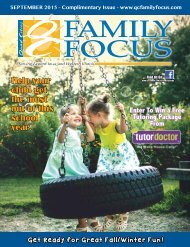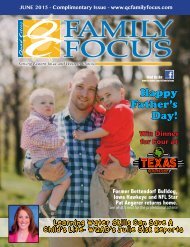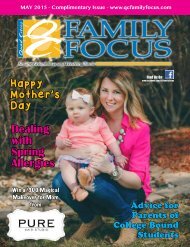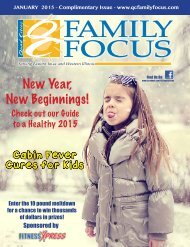QC Family Focus: October 2014
In this issue: A Look at the Very Real Dangers Facing Teens and Tweens Scarecrow Shenanigans Choosing the Perfect Daycare Helping Your Child Prepare for Kindergarten Treats and Snacking can Lead to Tooth Decay Learn more about QC Family Focus Magazine at our website: www.qcfamilyfocus.com Like us on Facebook: www.facebook.com/qcfamilyfocus
In this issue:
A Look at the Very Real Dangers Facing Teens and Tweens
Scarecrow Shenanigans
Choosing the Perfect Daycare
Helping Your Child Prepare for Kindergarten
Treats and Snacking can Lead to Tooth Decay
Learn more about QC Family Focus Magazine at our website: www.qcfamilyfocus.com
Like us on Facebook: www.facebook.com/qcfamilyfocus
Create successful ePaper yourself
Turn your PDF publications into a flip-book with our unique Google optimized e-Paper software.
Your ears never rest. Our hearing is a sense that we can<br />
never turn off. Even when we are sleeping, our ears can<br />
alert us to sounds in our environment. Hearing has such an<br />
important role in our lives, affecting how we learn, how we<br />
socialize and how we interact with the world.<br />
Every day our ears are exposed to noise. When the<br />
noise is too loud, or we are around it for too long, we can end<br />
up with Noise-Induced Hearing Loss (NIHL). People of all<br />
ages can develop hearing loss due to noise. The good news<br />
is: Noise-Induced Hearing Loss is completely preventable.<br />
To understand how loud sound damages our ears,<br />
let’s talk about how we hear. Sound waves enter your ear,<br />
vibrate the eardrum which in turn vibrates the three tiny<br />
bones in the middle ear. Those vibrations then move on<br />
to the fluid filled inner ear, called the cochlea. Inside the<br />
cochlea are microscopic hair cells which move with the<br />
vibrations. The movement of the hair cells creates a signal<br />
for the hearing nerve to carry to the brain. The louder the<br />
sound, the larger the vibrations. When the vibrations are too<br />
large, they damage the hair cells in the inner ear. Damaged<br />
hair cells do not heal, they do not grow back. They are gone<br />
for good.<br />
So how do we know what is too loud? Sound<br />
is measured in a unit called the decibel (dB). Normal<br />
conversation may average around 60-65 dB. Sounds at or<br />
above 85 dB may begin to cause hearing loss. Many sounds<br />
we hear every day can be damaging to our hearing. A very<br />
42 <strong>October</strong> <strong>2014</strong> - <strong>QC</strong> <strong>Family</strong> <strong>Focus</strong><br />
It’s a noisy world. Protect your hearing!<br />
Heather Sandy, MA, CCC-A<br />
Audiologist - Audiology Consultants, PC<br />
See What’s New And Exciting<br />
With Hearing Aid Technology<br />
Now Works With I-Phones!<br />
Call today for a complete<br />
hearing evaluation!<br />
1931 10th Ave. E,<br />
Milan, IL<br />
(309) 283-5902<br />
general rule of thumb says- if you have to shout to be heard,<br />
the sound may be damaging. Here are some examples:<br />
• Lawnmower –<br />
90 dB<br />
• Personal music player (MP3, iPod) - 105 dB<br />
• Live concerts –<br />
100-110 dB<br />
• Large stadium peak crowd noise - 120-130 dB<br />
• Firecrackers -<br />
145 dB<br />
The longer you are exposed to the sound, the more<br />
damaging it becomes. A perfect example of this is the<br />
personal music player with headphones. These devices are<br />
so small and convenient now, that they are often used for<br />
hours at a time at levels that can be very damaging to the<br />
ears.<br />
Hearing loss from noise exposure often happens<br />
gradually and can be difficult to notice at first. If you have<br />
a ringing or muffled sound in your ears after being around<br />
loud noise, that can be a sign of noise damage.<br />
Now that you understand the risks, let’s talk about three<br />
ways to protect your hearing:<br />
1. Walk Away: The further you get from the noise, the less<br />
it can damage your ears.<br />
2. Turn it Down: If you can control the volume, turn it<br />
down to protect your hearing.<br />
3. Protect Your Ears: Use earplugs or ear muffs for hearing<br />
protection when loud sounds can’t be avoided, like<br />
mowing the lawn or a loud concert.<br />
Encourage these healthy hearing habits with your<br />
family and friends!<br />
Audiology ConsultAnts P.C.<br />
2215 E. 52nd St., Ste. #2,<br />
Davenport, IA<br />
(563) 355-7712<br />
1616 Cedar St.,<br />
Muscatine, IA<br />
(563) 264-9406<br />
www.audiologyconsultants.com<br />
Download for the<br />
App store<br />
Hammond Henry Hospital<br />
600 College Avenue<br />
Geneseo, IL<br />
(309) 944-9181


